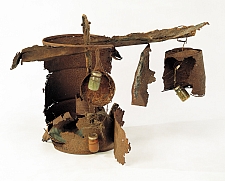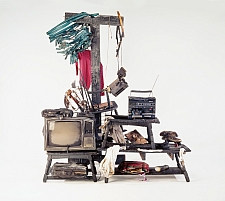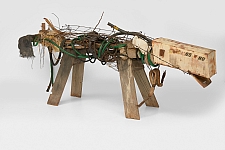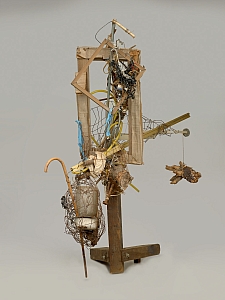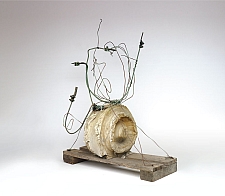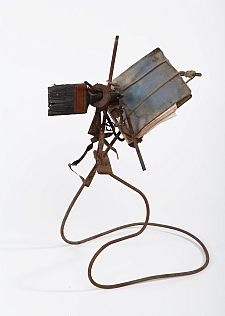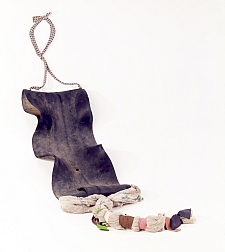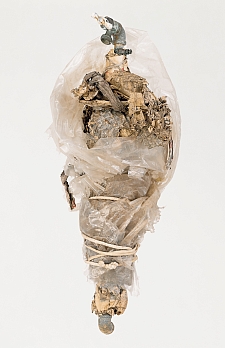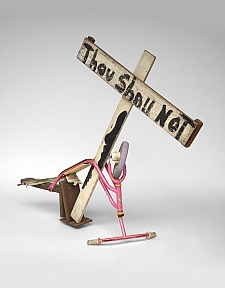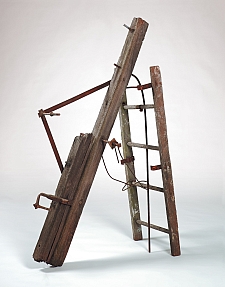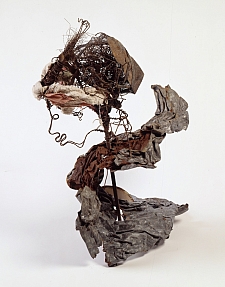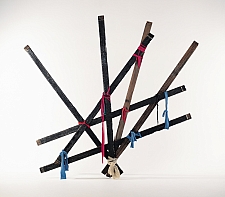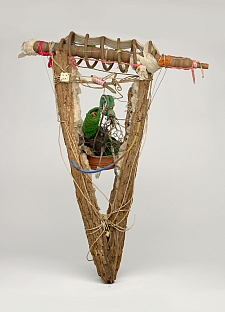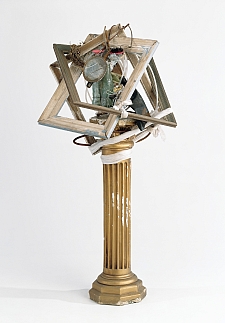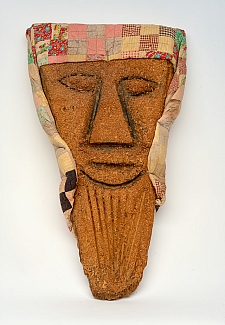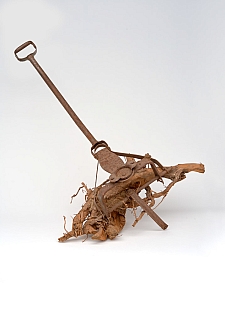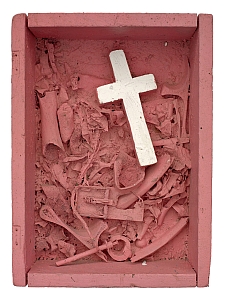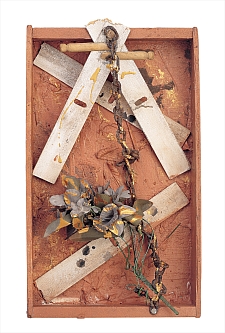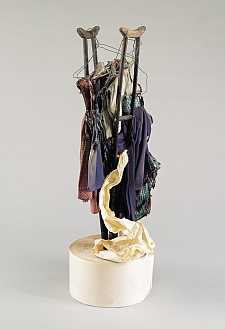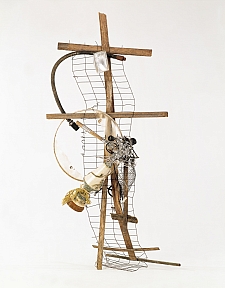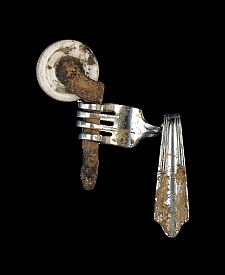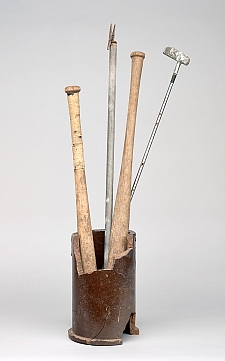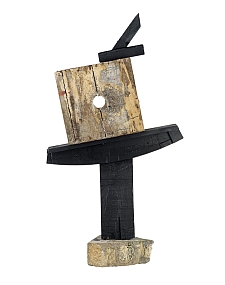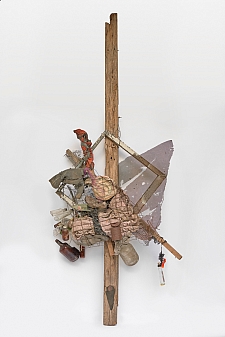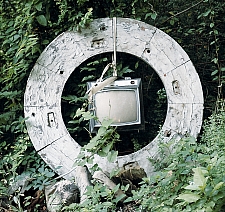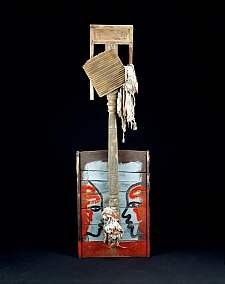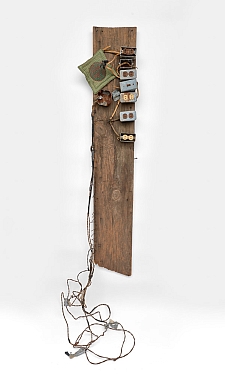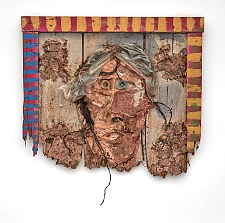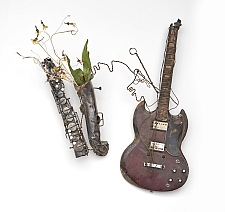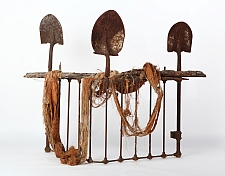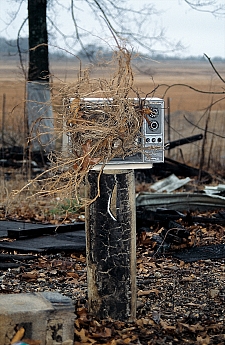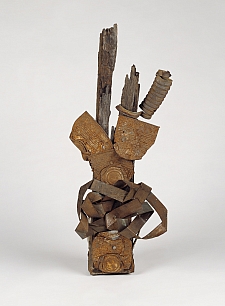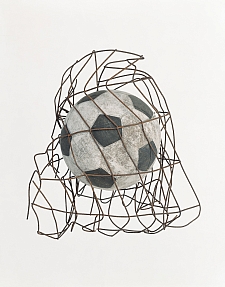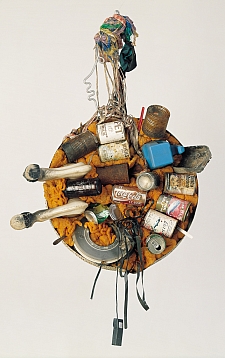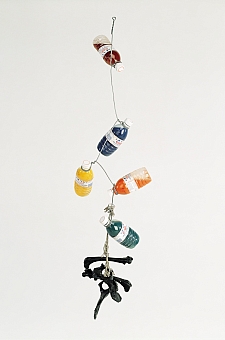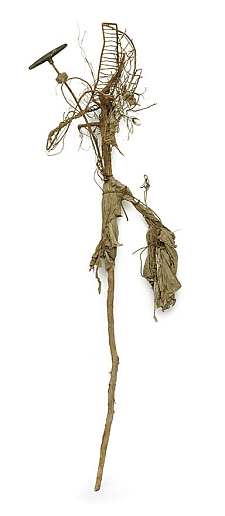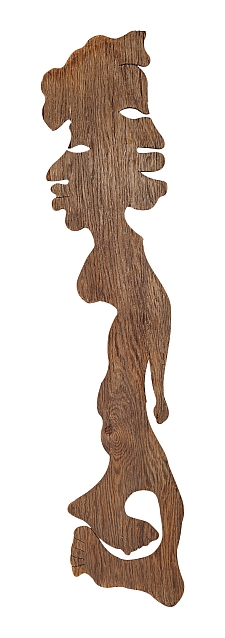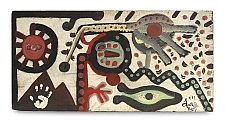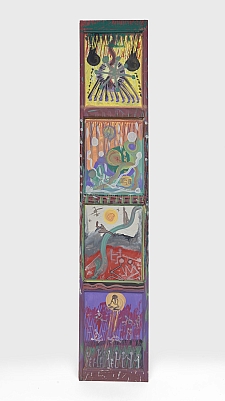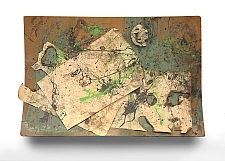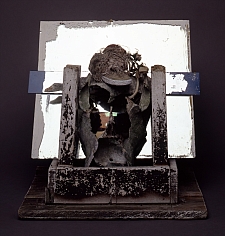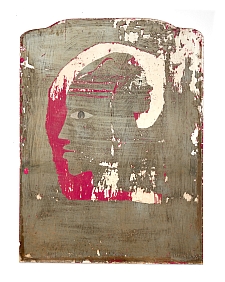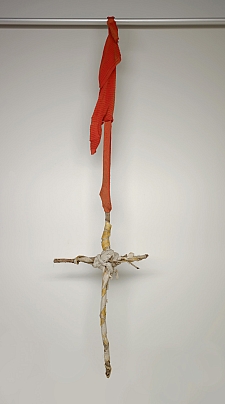Lonnie Holley
About
My mother's name was Dorothy May Holley Crawford. My father's name was Arthur James Bradley. When I was born this lady asked my mom could she keep me, because my mom already had another baby. So the lady took me away from my mama and took me to Ohio, and she kept me up there until I was four years old. Then she brought me back to Birmingham, Alabama. She brought me out near the fairgrounds, and the lady sold me to another lady for a pint of whiskey. I was a malnourished, skinny little baby with a big, big head. They called me "Tank" for awhile—"Tankhead." I had a real big head.
I ended up with a lady I called "Big Mama." Big Mama was nice. Big Daddy wasn't. I remember that when I was seven years old, Big Mama died. I didn't know what death was at seven years old. Every morning I would get up and go to school. I would fix her some food and leave it there on the side of the bed, 'cause he was working at night and he told me to watch her till I got ready to go to school, and make sure I left her food to get. So she had died and I didn't know it, and he hadn't come home that night. He didn't come home the next day. So she laid there dead for about three days. He came in and he had whiskey on his breath. And he asked me how Big Mama was doing, and I told him she hadn't ate for the last three days, and I couldn't get her to move. He asked me if she had used the bathroom in the bed, and I told him no, she hadn't did nothing. So he went in there and shut the door. And I heard him start hollering. He was running and shouting, and he was screaming, "She's dead, she's dead," and I'd never even heard that word. And then he came out fussing at me, how come I didn't let somebody know she was dead. So I got punished for not knowing what death was, and I got a whipping, and didn't know how to handle that. And I was sad. He had the radio playing. And he had this record on: "Swing Low, Sweet Chariot, Coming for to Carry Me Home."
I remember the undertaker coming, and the undertaker was getting ready to take her away, so he put this record on: "Undertaker, undertaker, please drive slow / 'Cause this body that you're carrying, sure hate to see it go." I remember these things—that these were things that hurt. I remember at seven years old I kept getting whippings almost every day after Big Mama died. And eight years old, I was getting whippings. I had to go outdoors and cut wood all day. By the time I got nine years old, I had built me a house on top of the roof, because we were living right across from the drive-in theater. I ran me a speaker through the sewer pipe, and I put it up on the house, and I made me a little shed where I could watch every movie.
Big Daddy didn't know where I was one night, and I was up there. He had got drunk, and next morning I climbed down off the top of the house and climbed in through the window and got in the bed. He lit into me with that ironing cord. He tore me up. He whipped every which-a-way. I was running all over the room. Then he made me cut wood all that day. And I just got tired of it. And so he called me into the house; he was going to whip me one more time that evening, and he say, "You gonna cut that wood?"
And I say, "No, I ain't cutting no more wood," and I throwed the wood down, and he got at me. And he say, "You get some wood in here for this fire to keep burning," 'cause we had a old "Big Boy" heater and a fireplace that had these big old logs I had to bust up. So I got my wagon and took my dog, and I knowed this candy company down the street that I could get wood from. And I went running across the street. I didn't even look. I wasn't caring. It was at a time when I didn't care. And that is something that I don't hardly like to say, that I don't care. But I took that wagon, and before I knew it, me and the wagon got hit by a car. That car drug me for two and a half blocks, and I was up under the car, bouncing around. So both my legs were broken. Both my arms. My knees were scarred up. My legs. I had a fractured skull. I stayed in the hospital unconscious for three months, and all the children in my class were writing me these "get well" cards. When I did come back to school, all of them were standing around my desk. At the time my name was McElroy. That was my adopted name, Lonnie McElroy—everybody called me "Macaroni"—and then they said, "Macaroni done come back." It was a fun time, if you can look at the seriousness of your life, and what you have to go through. So I was thankful. And guess what? I got a whipping for running away with the wagon.
Around my eighth year, I had kind of quieted down and went to school the whole year. By the time I got nine years old, this lady came in our life. Her name was Miss Claudie. I think Big Daddy was sweet on Miss Claudie—and she would always look at me, and say, "Tonkie (that's my Indian name), Tonkie, you got a big family. I know your mama. Your mama got so many kids." She put that in my mind, and I kept it in my mind. The next time I got a whipping, I ran away to try to make it over to my mama's house. I didn't know how to get there from West End because I was young. But I tried to find my way from West End to the airport. I got lost, and it was too dark for me to get home. And I got locked up in the back of an old Chevrolet, got that kind of hump-backed trunk. It was cold that February night, so I just slept there. The next morning I kept beating on the trunk, and the man that owned the car, he heard me beating. "Goddamn nigger, what you doing in my trunk?"
So I just told him I got locked up in there. "I wasn't trying to steal your car." I was nine at the time. So when I did get out of this trunk, I wasn't going to go back home. I went down to my friend Cheetah's house. He was just a little black boy that everybody called "Cheetah," 'cause he had a lot of energy and he looked like Tarzan's monkey. Everybody picked at him. I had another friend, too, called "Egghead," so we was the kind of guys that they would call "nerds" now. It was Macaroni, Egghead, and Cheetah. Cheetah say, "Don't Mr. Campbell owe you fifty dollars?" So we went over to this drive-in 'cause I picked up paper every morning, and he hadn't paid me. Mr. Campbell was real drunk 'cause he drunk all that beer. So he was laying up in there, all that pee down underneath the bed, and we knowed he was knocked out. And he didn't have no money, so we took all the batteries, we took all the flashlights, and loaded them up in a sack. So when Mr. Campbell woke up, he called the police. I had got home and got in the house. Cheetah had went home. So the police came to my house and he knocked on the door real hard. "Open the door, open the door." Then Big Daddy got up and went to the door. "What's goin' on?" Police say, 'Where that damn boy of yours? Where is that damn money?" The drive-in man had lied: we didn't get no money. He had drunk the money up and said that we got it.
So Big Daddy said, "Get the money out of him," and he run in there and jerk the ironing cord out of the iron, and, boy, he whipped me in front of the police.
And they say, 'We ain't satisfied."
I had blisters all over me, bloody blisters, that next morning. And I said I wasn't going to take no more whippings, and I meant I wasn't going to take no more whippings. So I left. After Big Daddy went to work, I left, and I ran down the track. I got off the track, I got into the creek, I got out of the creek, and I got downtown, and downtown was big to me 'cause I never had been in Birmingham downtown. Terminal Station was down there, and right across from there was some workmen's houses, because they had foundries and things all around. The city was in bloom, Stockton Fitting was in bloom, Acipico Pipe was in bloom, Terminus Foundry—all these foundries were real active at the time. Sloss Furnace was lit up with molten iron every night. You could drive up the viaduct and see it.
So what I did, I went down to Terminal Station. I was fascinated with trains. I'd heard them because the tracks wasn't too far from our house. I hadn't seen them that thick before. So, I looked around there, I think it was around midnight. It was so cold out. I saw these two quilts on this lady's fence, and I wrapped these quilts all around me and climbed up on the side of the train. The train was just sitting there idle and running. Well, the exhaust was getting me warm. That's what I really got up there for. I didn't really get up there to take a ride. The exhaust was going to keep me warm.
So the next thing I know, the engine was moving, and I mean it was moving fast. And it got faster and faster, and I fell asleep. After I fell asleep, the next thing I know we was crossing this big old long bridge. The sun begin to come up, all this water up underneath me, and I didn't know we had got to Louisiana. Coming in to New Orleans, this big old long tall trestle, you look down you could see nothing but water and the boats and things in the water. So after we came across the water, we came into the change terminal there and I remember going into this big old depot where you go to clean the engines, and then I remember having to sit still until the engine man cut it off and got out of the train. I thought the train was empty. And then I jumped down off the top of the train, and an old black man was down there watching the train. He hollered, "Holy Jesus! What the hell is you?" And I didn't know the soot was all over me, and it made me look very black. He say, "Oh my Lord Jesus!"—he must have thought I was a big voodoo doll that had jumped down off the train, 'cause they believed in black magic and stuff like that. I didn't know I had frightened the man that much. I'm trying to take this stuff off me and show him I was a boy, and he was running around, hollering, "Help me! Help me! Something in here!" And then when I finally did take off all these quilts and things, and he saw my face and he saw I had arms and everything, then he said, "Hey, little man, where did you come from?"
And I said, "Across town."
He said, "Whereabouts across town?"
I said, "I live in West End, but I ranned away from home and came downtown and got on the train and it took me back across town."
And he said, "West End! There ain't no West End out here! We got an East End. East End, New Orleans." But I thought it was a song, you know, he say "New Or-leens," you know? And then he called his friend and said, "Hey, you know anything 'west'—where's West End?'"
The man said, 'West side's where all the rich people live." He said, "What your address is?"
I said, "I don't remember my address." I was nine. And I said, "I live out there by Constantine's Restaurant and B&B Barbecue." He didn't know nothing about none of that stuff.
So he call another man in there, and tell him, "This boy done runned away from home." And then the man told me, "I know where you need to go." The man gave me $1.50. He told me to go to the store and tell the lady to cut me a big piece of bologna and put it on two slices of bread. And she sat me down and told me to take my time and not get "digestion," and I didn't know what "digestion" means. So I was hungry and I was eating it fast, and she told me to slow down. All them people came around, they was all dressed up, coming by the shop, all them feathers all over, and I was looking at them. And she says, "Mardi Gras time." And she said, "Yes, they getting ready for Mardi Gras. You ain't never been to March Gras?" And I say, "No." She said, 'Yeah, your mama must keep you locked up in the house." Then the man called on the phone. She said, "Okay, I'm sending him on down there." And she say, "Go down to Opra house. He stay right there. You see all that stuff in the yard, all those trees and things—that's Opra house." So I went down to Opra house. Now Opra, he was a wise man to me; he had everything around this house, everything you could imagine. He had this mule and this wagon. And he sold everything on there. Pots and pans, he sold brooms, he sold mops, he sold fruit, he sold vegetables, he sold watermelon, he sold rags, and he sold big washtubs, logs, everything on that wagon that you could name, he sold it. And he brought it out there to them people where they could have it. Everybody liked him. They knew him when he come down the street. They knew that old mule. That mule walked softly and it clicked when it come down the street. I really liked Opra. I stayed with him for about three months. He treated me nice. He taught me things. He was a wise old man. He never turned nobody down. I think that's where I learned that giving nature from. If a stranger come to him, he helped him if he had it. He was giving away the old vegetables, he gave it to somebody that could use it. We throw away too much in America, we throw away too much in the marketplace. Back in my days, when I was coming up, a little mold didn't hurt. Cut that mold off and eat that cheese; cut that mold off and eat that bread. We had to make use of what we had. Today we throw away so much.
But even with this good and wise man, curiosity got in my way. I wanted to know how fast his mule could run. Nobody had seen him do no more than just a little simple trot. And Opra got off the wagon that day, and when he got off the wagon, he took the bridle, he put the reins in my hand: "You've got him under control now." He left me with the mule, and I was sitting there, and I wanted to see how fast he'd go. So I pulled back and hit that mule so hard, and that mule went running down the street throwing pots and pans and fruits and vegetables everywhere. You know, that was my last chance. He was so mad with me. I believe he really didn't want to call the Juvenile, but I was a runaway, and he had been keeping me a long time anyway, and he was worrying about who my mother were. So they put a tag on me in New Orleans Juvenile, they tagged me and put me on the train, and sent me back to Birmingham. Aunt Sallie and my grandmama, they came and got me, and Big Daddy came to pick me up from them. He kept me locked up this time, so I stayed out of trouble for about two years after that.
And my next bit of trouble again was with Cheetah. Cheetah and I went to town. We went in the back of a store and we crawled up in this hole and got all their candy and stuff out. It was a hole that somebody else had made. Cheetah told me to go in there with him, and we went and we got bags and bags of candy. When we was coming out the hole, we saw the Big Man. He stomped his foot down like that, liked to stepped on my hand. He said, "You bastards going to Juvenile." So we went to Juvenile. I was twelve years old then. Then one day, Aunt Sallie and Uncle Jesse came and got me. They took me home. I didn't get no whipping or nothing.
Then one day I was with my cousins. We went downtown. We walked across the viaduct, 'cause I remember the hot iron and the steam coming up from Sloss Furnace. That's the reason I always like to go back. The incident out at Sloss Furnace [the destruction of Holley's outdoor sculpture, The Goal of Creativity, in 1995-ed] is just a burnt memory for me, when they tore the sculpture down out there, because all my memories about Sloss had been grand memories. But I remember going across the bridge, me and my three cousins. And we went into this jewelry store, up through the window in the roof, and I had jewelry up my arms, up both arms, I had watches all up my leg. We wasn't but twelve. And Charles had baseball gloves. Eddie had all the peanuts and the popcorn and the potato chips and the cold drinks. We got stopped underneath the viaduct. And the police officer asked us where we was coming from, and we said we was just coming from out of town. And we had all the new luggage tags and stuff. And he say, "You must have bought brand-new luggage to travel with, didn't you?"
So they took us right on down to Juvenile. I was going to go to court, and I finally would have got to go home, but the boys jumped the man that cleaned the place. The big boys jumped him. And then we got carried off to the Juvenile downtown. And they jumped the night watchman—I didn't jump him—and they throwed him down and took a sheet and tied it over his head and throwed him in there and locked the door. And we took the keys to his car, and we got in the man's car and went two blocks and had a wreck into a telegraph pole. We had totaled the man's car.
So the next morning, after Juvenile Court, they loaded us in the car, and took us to Mt. Meigs. Mt. Meigs was an industrial school, where you go and learn farming. You go and learn how to plant, you go and learn how to hybrid, you go to learn how to make clothes, sew stitches. I know how to do all those things. I know how to cook. I know how to sew. I know how to iron. I know how to can. I know how to put up hay. I know how to harvest sweet potatoes. I know how to pull peanuts out of the ground. All those things I learned.
I stayed in Mt. Meigs about two and a half years. I didn't get no further than the seventh grade in school. So I was being educated, but field-hand-like. Mt. Meigs was in the country. I worked cotton fields during the summer. I know how to plant, hoe, and chop cotton. Then we came to the winter time.
We were chopping corn stalks. The fields were about sometime a mile and a half long. So you got about three to four hundred boys in the field at one time. We'd learned you have to do things in line and order. And when they told you to move out, everybody move out there at one time. And when they tell you to stop, everybody stopped at the same time. Mr. Glover was in charge of the field, with the field hands. And I told Mr. Glover, "Mr. Glover, I gotta take a number two," and that means you get down in the back of the row, and you squat down, and you pull your pants down and dig you a hole like a rabbit or whatever. And you doo-doo in it. So I was taking number two and I got back in the back of the field. Had my pants down. I had squatted, I was there, and they kept getting further and further up the row. They just kept going up the row. All the "charge boys," they had forgot about me. Nobody wasn't watching me. Now, the charge boys were the boys that were the trusties, sort of been-gooder-than-the-other-boys, the boys who were almost ready to get out of Mt. Meigs. The charge boys would charge you if you runned away, they'd charge and run behind you and beat you and drag you back. If you had money in the commissary, they wouldn't beat you, if you give them your commissary money.
So the charge boys had gotten way up there. I just started crawling backwards. I didn't even pull up my pants. I crawled backwards and backwards for about half a mile on my knees, I just crawled backwards until I got to the fence. And when I crawled under the fence, I finally pulled my pants up and I started running through the woods. And I ran and I ran and I ran. Because Mt. Meigs's property sometimes ran ten and fifteen miles before you get off it. That night, I don't know what time, I was still running, I fell in a grave. It must have been about two or three o'clock. I didn't know it was a grave at the time. I thought it was just a hole. So, the next morning, I found out it was an old growed-up graveyard near Tuskegee. So when I got up to Tuskegee, I got a chance to get something to eat, but it was in a tractor place. I looked in the window, and there was some cheese up on top of the refrigerator. And there was some sardines on the table, and I was so hungry, I broke in the place. I was so tired. I sat there eating the cheese, sardines, and crackers, and I fell asleep. So the next thing I know, this real heavyset white man had grabbed me in my chest, by my collar, and he said, "Goddamn it, what you doin' here?" And he took his fist and knocked me out. See, I had on fatigues, and fatigues had identification. Every time you go to Mt. Meigs they put clothes on you, and they put your name on there so everybody knows who you was. They use old army surplus. So my name, Holley, was on there because I had got back with my grandmama by that time. I wasn't living with Mr. McElroy at that time.
Mr. Holloway was called on the telephone. Mr. Holloway wanted to show the white man that he could do the same thing that they had did to me. Mr. Holloway was a black man, a superintendent of Mt. Meigs. His name was E. B. Holloway, the records have to show. What Mr. Holloway did, he slapped me, too. "Come on darlin', come on, what you run away for?" And he kept slapping me, slapping me. He called me "darlin'" cause he called us all "darlin'."
He say, "What you want to run away for?"
I say, "I was tired."
"Ah, you're not planning to run away no more, huh?" And then he looked at the white man, and he took his fist and knocked me out. So that was two times I was knocked out that same morning. So, that's two more licks there went upside my head. The next morning the charge boys came and got me from the cell I was locked in. They took me back to Mt. Meigs. Two of them took me by the arm, and one was walking behind me, had my arms stretched out. They took me to the morning bench. The morning bench is sort of a bench that had been made out in the middle of the field, a big old open field, and had a big old cedar tree, a tall shady cedar tree. That's what they call their "example tree." When you got to that example tree, everybody had to look at you being made the example. What I'm fixing to say is: that example tree, for me that day, was one bloody situation. I remember Mr. Holloway and Mr. Gladline and Mr. Reddy was standing up there. Mr. Reddy was a shell-shocked army man. He'd beat you any kind of way. After getting on the morning bench, Mr. Glover told Mr. Holloway to give me one-fifty. So I had to get 150 licks that morning. So my thighs was bust open, both of my thighs were bust open and they were bloody and all in the calves of my legs, and he had hit me and knocked me out, so he swelled my head up and knocked that open. So next morning, I remember them taking me to the shearer, and this guy put an X in my head with the sheep shears, and then they had to take my pants loose at the seam. They put something on me, 'cause I couldn't put on pants like normal boys, 'cause my thighs had been busted. And they put me on light clothes, so that all that blood was showing. I was an example on the rock pile. This big old pile of rocks, nothing but white rocks, all around me, that's all I could see. I could see so many images in the rock, made me think about making things out of rock, but I didn't know nothing about art at that time. It's just all I had to look at. So I mostly tried to stay in the same area until I got well. Mr. Holloway walk by there day and night. They gave me three squares of bread and one cup of water a day. Just bread and a cup of water. Three squares, they call it, that's what I had every day. I was thirteen. I got out at fourteen and stayed with Grandmama. After that, I left her, and I learnt about my brothers and sisters.
My oldest brother was named Will Holley. They called him "Sonny." We left Alabama and we went to Florida, me and Sonny. I followed behind Sonny 'cause he was my oldest brother and I loved him very much. First we got a job at Orlando Country Club. I was working out on the lawn, cutting grass and stuff and Sonny was working in the kitchen, and then I got in the kitchen washing pots and dishes.
I was getting ready to get fifteen, and my girlfriend Angie Love got pregnant. She told me she going to have a baby. So, what I did, I told Sonny I got to make some big money 'cause Angie Love going to have a baby.
They got these "seasons" every year where you can get on a bus and go up north for a season, so I got on Harvey's bus and we went up to Campbell's Soup Company, picking tomatoes in Lima, Ohio. Harvey, he was the bus driver. Bus drivers know how to flimflam. They know how to tell you that you going to get a certain amount of money; then the man done paid him, and he's not giving us but a little bit of money. Every month he cut the money down until we owed him more—more than we had. He was black, and he'd take seventy field hands, each one of them getting one hundred dollars. Campbell Soup Company was paying big money. They gave Harvey one hundred dollars for each one of us, every day! And Harvey had gotten it down to giving us thirty-five dollars a day, and he was keeping the rest of the money, gambling. One night, old Shakey heard him and his girlfriend get in a fight, and Shakey say, 'Youngblood, Harvey be up there jumping all over that woman. He going to kill her." I went up there. He was beatin' on her real bad, and she hollered, "Goddammit, I'm going to tell on you, I'm a-tell on you." I was the youngest thing in the bunch, and they call me 'Youngblood," and I went down to try to get some of the field hands to come up there and stop them from fighting 'cause she was bleeding. By the time we get up to the house, she was out there screaming about how Harvey had been cutting our money, and how he had been spending the money going gambling, and Harvey come out on the porch, and Shakey picked up a brick, and he took and throwed the brick and knocked Harvey down on the porch. And then somebody said, 'You better call the law, 'cause they going to kill him." So somebody run in the house and call the overseer of the field. And this big old long car come running down through there, all that dust was coming. They was beating Harvey, everybody had jumped up on the porch. And then the man shot up in the air. Bam! "Stop it, stop that shit right now." That was the Campbell Soup Company man. He say, "Stop it, what in the hell's going on here?" And then he found out that Harvey had been taking the money and gambling, so he ran us all off the place. "I'll get me a new crew in the morning. Get on." Then he gave us some money to get back home.
I left there with a thief and a man who was studying to be a judge. They said, which one you want to go with? The man who was studying to be a judge, an attorney, or something, had to work to pay for college. Both were black. The one that was a thief, he told me, "We get home tonight, you come go with me." Both of them were my buddies, and I couldn't make a decision, and I told both of them, 'Y'all go on, I'll get home by myself."
That next morning early I was walking down the street, and these guys came by. They were white guys, two of them in the car. They were so drunk, and they picked at me, and then one of them took a beer bottle and throwed it and it hit me hard on the ankle, and I was scared. I wanted to grab my ankle, but I know if I bent down, they going to jump out and run and beat me, and then they say, "Don't you want a ride, nigger?"
And I said, "No, I don't want a ride." I said, "I live right down the street."
Then they said, "You gonna ride in this car." The highway patrol was right up there and he happened to see the man hit me with the bottle. You wasn't supposed to be up on the interstate, but I was. The police came down there and that was the only thing that really saved me. And the police told me to get in the back of the car. He took me to a truck stop, and he say, "You'll catch a ride from here, right through to Florida."
So, I didn't know what the directions was, so I rid down from Lima to another place in Ohio. When I got off the truck, the man gave me twenty dollars and told me to get a ticket. And I got a ticket at the bus station, and I told him to give me a ticket worth twenty dollars. So he gave me a twenty-dollar ticket back up the road. I go up the road and I look out and I say, "Look like I already seen that." I say, "Bus driver, I got a twenty-dollar ticket. Where we going?" He say, "We're goin' to Lima, we're going into. . . ." I say, "Wait a minute. Please let me get out."
I got another ride back down, and this time I got a ride with nothing but hustlers. I mean, these guys were flimflamming every station they pulled in. They had a big old roll of paper, with a little bit of money wrapped around it, and they went in, told the man, "Give me change for a fifty" or "give me change for twenty." Then the other one would say, "Well, you owe me forty-two-dollars-and-something 'cause I got the gas filled up, and I didn't get but seven dollars worth of gas." Before you know it, they was flimflamming the man out of a lot of money. Say, "Get in, get in, before he count his money." So they kept on hitting filling stations like that all the way from Ohio to U.S. 1 to the coastline. I got a ride on down into Jacksonville.
I ended up in Disney World. My sister Betty and I worked there. I worked at the Contemporary Motel there. I was a spaghetti chef, and I was a breakfast cook, and I saw a lot of wonderful things. Talked to people on a first-name basis. That's my first time ever relating to white or any other person and not having to say "sir" or "ma'am." You can look in their face and just call them by their first name.
I remember Mickey Mouse. When you saw Mickey Mouse, it was like he was a high status, but he wasn't no more than a boy in a rat suit. But we had to see him as Mickey Mouse. So you just called him "Mickey." "Hey, Mickey," "Hey, Minnie." You know what I'm saying? "Hey, Donald!" "Hey, Goofy!" Whenever they came by. So we worked there and it was fun. I made big money. I had good times. I was talking to children.
Leaving Disney World, I messed around in Orlando, Florida, for about two years. Then I left Orlando, Florida, and I was coming back toward Alabama, and I stopped off in Jacksonville, Florida, and this is where four of my children, little Lonnie, Abdullah, Eustice, Niema, those children were born. Leaving Jacksonville, I came back home in 1971, back to Birmingham. Left those children behind and come back to Birmingham, Alabama.
I had lived the best of life until I came back home to Birmingham. Coming home took me to seeing what my mama and them needed. My mama and them were still living in the 1800s, with slop jars, and outdoor bathrooms, and no running water, and pigs in the house, and chickens and things in the backyard, and ducks and things roosting in the house. So I had thought, What's wrong? Here in 1972, I found my mother living in a kennel, 1800 setting in the 1970s. It was kind of hard for me to deal with. But coming out of Florida back to Alabama, I had to kind of turn my mind around from the land of life I had gotten used to living, and reduce my mind back down to the kind of setting where my brothers and sisters lived. So that means using the slop bucket instead having a bathroom. I had to get used to a cold house. If it rained, we got under plastic. My grandfather had built a sixteen-room house—eight rooms for my family and eight rooms for my auntie. And this was on the Airport Hill, the same community that I've haved in now for more than twenty years. The children, they didn't have the money to get factory-educated. Our clothes, the clothes and things we was wearing, was mostly handed down, or we had knocked on somebody's door and asked them did they have anything that they didn't no longer wear. My mother was a proud woman, even having twenty-seven children. She didn't beg. There was moral support. She never got any assistance, she never got any food stamps. So it was between the largest children and the man she had at that time, because my mother had a lot of relationships, in order to get all those children. My grandfather, his name was Willie Holley. He was the best part of my mother's financial support, because he was in World War I, so he got checks until his life was over. But my mother, still being an independent woman, tried to do as much as she could for each child. But most of the children ended up in foster homes, because of her not having the space, or not having the kind of time that should be spent with children.
So, when I got home to Alabama I had to go through some hardships. You had to characterize yourself as everybody else did. You couldn't act like you was more than they was, because they'd quickly notice it. There was handicapped ones in our family who did not know how to read and write. So for me I wanted to come home, and serve my neighborhood—not only my mother's family but to serve all my neighborhood, to show them that there was so much yet we could find and we could use. We don't have to get drunk and deteriorate our minds, or get loaded with drugs, or kill ourself. I was trying to take on a lot of their burden with what I had learned. And I think the most hurting thing was that I couldn't force them to change. It was that I was trying to bring in the pictures of education, I was trying to bring in the toys—not just toys to play with, but I wanted toys for their mind, where they could see their numbers, they could see their letters, and it could help them develop.
I had a land of way of getting what I needed, going down behind these stores, whatever was there for me. If I didn't have the money, I could go behind the store and get the very best they was going to throw away, just by taking my broom and my mop and water bucket and doing a httle bit of volunteer cleaning up. And after a while, the man was giving me every black bag that the store had to throw into his dumpster. So, for me, life was not hard, and I wanted to make others realize that life wasn't hard if we didn't want it to be. But that was the hardest thing to do, making them understand.
I had started getting depressed, didn't find that I was useful any longer. At that time, my peoples was getting started on their welfare checks, their Social Security. You got food stamps. The things that was really the basis of helping them grow, learning to survive, and be strong, the free money had took the place of that now. All the things that I had taught my brothers and sisters how to do to keep them from doing things that would get them in trouble, had become not useful. So, I had started feeling pretty down. I was trying to fulfill my own personal life, which I had learned how to be very comfortable with. And in between that, doing for everybody, maybe two or three hundred peoples that I was scavenging for behind the stores to feed. I had a lot of friends. I think one of my best friends was Miss Sarah Kelly. She was an old lady in her nineties. She was dirty and sooty, because she had a heater and when you opened up the heater, you may get ashes blowed on you. So she was a person that couldn't get up to go take a bath. So everybody in the neighborhood land of shunned the older people that had got dirty.
So with me, in the neighborhood working with my mother, I'm trying to do good and not get depressed. It was so much, because I had so many people that I was trying to think about, until one day it just all blew up. It was too much. It was just too much. I just had got off work. I was working in the school system for the Birmingham Board of Education, there at Ellington School. I got me a fifth of Red Dagger that evening. And it just made me more and more depressed. And once I got the wine, I went riding around drinking, trying to be happy, and that didn't satisfy me, and I bought me another one. And I think I was going over to where my mother stay, and just when I was getting ready to come on the airport, my big brother—his name is Lester Holley—he was standing on the corner. And I had an old 1954 Chevrolet, greasy motor, all that oil wasted on the motor. Six-cylinder motor, standard shift, stick in the floor. I had big pop wheels on the back, small pop wheels on the front, and I had nice rims, and I came up to the curb, and my brother said, "That shit won't do nothing." And I put it in second gear, and when I threw it in second gear, I had all these gravels under my wheel, and I started spinning, and then looked around, and I'd throwed all the gravels at a police car. So all these gravels hit the police upside the head. They slapped the siren on me. Went to chasing me. I just left it in second gear for fifteen minutes. And I was running all up and down the hills. At that time, the police department didn't actually know the Afro community that well. So, I just had them chasing up and down the hills, jumping over the hills, and everybody was coming out of their houses, looking at this here like something from the movies. I think they chased me for fifteen minutes. They had the right to kill me, because any time the police being in pursuit of you, and you run for fifteen minutes, they can kill you if they want to. It was the last few minutes of the chase, and we was coming up this hill, and what I was trying to do, I was going to make a break and cut through the pass, and get behind my sister's house which was in the woods, drop the car off, and run to my sister's house, run through the woods. But what happened was I missed the pass because I was drunk, and I hit head-on with this tree. And the next thing I know, the motor was in the front seat with me, and I was all up in the steering wheel, and the door was opening, and this big old huge police was jerking me out of the vehicle. And he was getting ready to shoot me, and this old lady, Maude and Bertha's old mama, was at the door, and she hollered, 'You better not shoot him. You better not shoot him. We watching you. You can do anything you want to him, take him to jail, but you better not shoot him." So actually, that old lady, she saved my life. The tree, it hindered me. I still see that tree. I really want to get that tree out of that yard and make a piece of art out of it, 'cause there's a big old sore on that tree from where I hit it.
So, they took me to jail. They didn't beat me no more in front of her, but they took me to jail, and they beat me at the city jail. They had a photographer that come in there. And the photographer was taking pictures of the police, because I had—by my being drunk—I had kicked the police in his ribs or something and broke his ribs. So, I think that's the reason why they beat me real bad, because I had put hurt on him and put him in the hospital.
I had a huge debt to pay. I think I had tore up five cars on the road. I had fifty-something thousand dollars worth of damages in those cars that I had tore up. I had tore up ten to fifteen mailboxes off the side of the road. I had did quite a bit of damage. So, for me now, it is to think about my life still lasting through all that had happened. Think about making a U-turn.
This is when all of it happened, in 1978. By this time, I'm in my twenties—twenty-seven, twenty-eight—and I said, "Good God Almighty, if Lonnie Bradley Holley don't make a big change he going to be a dead man soon." So at this period, a change was being made. My new family came into being. I married Carolyn Rose Babcock. She was a foster home kind of person, so she hadn't really found happiness in her life. For us to get together, and for us to both be kind of alike, because I had been through several foster homes, and my wife had been through several foster homes. I saw her easily being turned into a street person in the wrong hands, 'cause she was beautiful. And it was just—I just loved her. But over the years of our relationship, I think the intent of me being an artist, and her not understanding that life we would get put into—it was something that we lost. And that's where our family kind of began to break apart.
My life is a big experience hopefully that somebody could see it, and benefit from seeing it. I tried to make art especially for the self. I tried to make art especially for the mind. I started that in 1979. When I met Mr. Arnett—I think we met each other in 1986 or 1987—meeting him opened up my mind. It was like clogged vessels as an artist, like things was so clogged up and so congested inside of me and my art. But I think Bill saw a little bit further than that, because I remember when he first came to the yard, and he said something about a temple that he had been to, and he placed me up there with those kinds of people. But it took quite a while for me to really see, to see those words, in my mind. It took quite a while for me to see myself being true to the words that he had spoken about me. Because it's not that I didn't trust him, it's just that, I think in any relationship, we had to get to know each other. And the more I learned of Bill and his family, the more trust came into our friendship. It ain't easy for a man to trust another man. It ain't easy for a black man to trust a white man.
The freedom came when Mr. Arnett came. We had something in common, because Bill had been a kind of curator, and he had did things that was trying to let the world know the constructed order from the spiritual, from the foundation. And my thing and his thing was altogether the same, in a sense. Like this white man's mind and this black man's mind had the same thoughts going on in them. But he had seen the world through actual contact, and I had only seen the world through National Geographic. What I had seen in the world was the possibility of humanity working together all over the earth. Maybe we never all knew each other, and maybe humanity was not to ever know all of each other. What I mean is that some men's contributions, like my own, would never be seen. But with Mr. Arnett, he allowed me to have the freedom of being able to create in an unobstructed way, being supported that I didn't have to have a job, I could go on and create.
I thank the people who was caring enough to support my art and my family. And my family is large, because my grandmother had sixty-something grandchildren, and I'm chief uncle. And my mother's children—they are fifteen now. And I'm chief brother. I'm the bank if they needed to borrow it, I'm the advisor if they needed information about how they're going to live from day to day; I was the answer to a lot of problems. If they didn't have clothes, I was the person that could take them to the flea market. If they didn't have groceries in the house, they'd know that Uncle or Brother Lonnie could go to the store because he have good tradings with others and gets us something to eat.
These things are what art allowed me to do, the act of giving me that freedom. And I thank Mr. Arnett, that allow me to understand the whole process of the blood flowing. The experience I had joining with other artists, meeting other artists, the ones that was old and already deteriorating in their minds and their health, and we got a chance to meet them. And for years, not only through prayer, but a kind of solid support of us going around those artists, making a bit of light for them. One day I was complaining at Bill about the financial conditions, of how we was getting no funding for our projects. And Bill said, "Lonnie, that's just the way of the art world." And I said I thought that was one of the crudest ways, to hold back opportunity. And I say, "Bill, why, why?" And he say this is what we're working on all the time, trying to get peoples to understand that not only do you have quality art out there, that you have great-minded people producing this art.
But these artists was not being respected, I mean, people could just go take the artists' work for no real cost, and people could say: This culture is nothing—their art ain't worth for nothing. And Bill say to me, "Lonnie, we will change all that."
It was some of the best art that had ever come from simpleness. What I mean by simpleness is that it is something so sincere and so pure that it would almost fit into the category of that. In the Bible, it say: I'll be coming back after that church without spot or blemish. And it may be one of the little churches that's in the midst of you all. So these was the kinds of minds—I characterize "mind" like those small churches that will be picked up and that will be exposed in the midst of religion, in the midst of divinity, in the midst of the divine order on earth.
I thought of that when I saw Mrs. Mary T. Smith. When I saw Mr. "Son" Thomas, when I saw Mr. Hawkins Bolden, when I saw Mr. and Mrs. Speller and Mr. Willis, and when I saw Joe Light, when we went down the alley and we found this hidden artist named Felix Virgous. We actually found these peoples out there, and they had great quality about themselves. Some of the most wonderful things was corning out of their mind. It was raw potential, it was raw effort, just coming out, waiting on someone to take the time. And it took a lot of time for Souls Grown Deep to give you this kind of information. It took almost fifteen years, maybe thirty, forty years for somebody or somebody's effort to bring you this kind of information about this world. And these artists have allowed tomorrow to be able to be in a continuing factor. We've talked about everything from the cradle to the grave of mankind, of humanity. We've talked about materials one could not even believe. Every other artist has made a grand contribution to this giant scale, of this pyramid, constructed in the midst of life.
Some people that read Souls Grown Deep is saying that this is all about the African heritage. But that wasn't the basis. I think the basis was the acts that individual artists had performed in the midst of their own humanity.
These were the basic thoughts that were being selected: Mrs. Bessie Harvey's root sculpture, Charlie Lucas coming to the point of taking his grandfather's blacksmith work all the way up—we can make a possibility to change everything through some of the early methods of our grandparents. You take Mr. Hawkins Bolden using even the baby things, pots and pans, and then bring that to a point of stepping-a pair of pants that is made out of cotton, that comes from the cotton field, and somebody weaved it together, then he stuck more cotton in there. And then he makes in front of us a mannequin of his own vision to let us know, "Hey, life is still sitting in the midst of you all. Someone labored for this life, someone is there, this image is in my mind, my brother, my bad experience, getting hit, being blind." That echo, these sounds that still going on in his head, and when he has a fade-out in the air and every now and then one of those little trinkets that he have out there may make a sound. You can hear his sitting out in his yard, and all of his art is making these different sounds, because he had finally created his own kind of symphony orchestra, that he can sit quietly. Because I'm sure people picked at him because of his eyesight. And he had gotten rejected.
You can see Mrs. Speller and Mr. Speller doing their wonderful work about their partying and their loving and their dancing and their relationship at that time, Mrs. Speller being totally different from Mr. Speller.
You can see Joe Light experiencing his kind of mentality about his religion, and in this religion, he had allowed himself to see a vision, and the kind of rejection that others had towards the things he was saying as a black Jew. A vision of him taking a hike to the mountain, seeing a wildflower, all of these mountains and rivers he had made with so many different levels of painting, and then to talk about the atmosphere, and to see our earthly habitat in the habitations on our earth. You can see Joe Light just telling you all: Forget all about this bad stuff that we have had done to us and let's make it more beautiful.
You can see a person such as Mary T. Smith, see her strength. She could have took a simple stick and punched holes out there and planted seeds. What makes this woman defy? She has gathered up the old tin, she would take a hatchet and make all these praise images with their hands up in the air and all these simple faces of different people that she had been to church with, that she had been in the holy atmosphere, that she had been in the midst of the Holy Ghost, these memories of her children and her grandchildren that she had grew up, and keeping them reminded that this is holy, that this is more holy than we can realize, that this God is with me, that I'm going to paint him, and I'm going talk about my Jesus. Much I'm going to tell you the very best way I can. And that's with this picture. That this life is so real, and it's so beautiful. Mrs. Smith, being in her nineties, the offspring of slavery, in a place such as Mississippi, way down in Mississippi, where there's nothing happening. She was down in there where pulpwood and cotton picking, and sugar caning, doing whatever they could to survive down in there. And this woman worked so hard. Right beside the road, she got everybody's attention. They would stop and see her work. And she was really working for her Lord that was so deep inside of her. And I remember seeing her at the time when arthritis has fit in her hands, and I remember seeing her at the time when she'd had a stroke. But I didn't want no one to say that this woman was a senile old woman that was out of her mind. She had a stroke, she had these conditions to come on her in her older years. She had a great mind. She might not could speak clear because of her problems, but she was one of the most wonderful womens that I could ever meet.
I remember meeting Mr. David Butler, and Mr. Butler having his tin animals and those kinds of things that he had created. I remember going down Highway 61, there in Mississippi and meeting Mr. Son Thomas. And Mr. Son Thomas using the white clay that only needed to be wetted, and that clay could harden itself harder than a rock. Mr. Son Thomas had did a fish for me and he called me and say, "I'm a give you this fish, and I'm a sit you on top of the well, but remember that this well got a hole in it." So I still have that piece, and I got to remember that the hole could be in that world, because we as humanity is the hole in the world. We are the ones that have to fill these holes in each and every one of our minds, like Son Thomas say, with all of his skeletons and his skulls that he had did. He had did so many wonderful things-birds and squirrels and different things like that-out of this clay. But his memory was mostly based on his experience as a grave digger, seeing so many lives. I imagine that at the time the coffin was closed, his memory was of the profile, the hairstyles, and the beautification of those corpses that was in those graves. So this is what he reflected, what was in his mind, what was in his heart. What was there was actually reflected not only through that, but through his blues, his music. He was adept at blues singing. So this man had as a relief from his art to go to music. And I use music as a relief from art. And others use music as a relief from art.
But how do these two acts of art come together and perform for humanity? How do any of these artists that are in Souls Grown Deep reach you, your mind, as performers, that we would have a better life in the future? How can I myself sit up and say that I ask for fifty thousand years of better preparation, that we can come up with thought, that we can better understand ourselves when everybody is afraid of 2000, and the hazards of our planetarial existence that seems to be threatened by prophecy? Prophecy from Daniel, prophecy from Psalms—the Psalms of the Bible is prophecy—and then we have Nostradamus that has given us prophecy. And then we still have those future-tellers of today that is telling us of things that is going to occur. If we don't testify our mind right toward the peaceful method, towards a better earth where our children could live, play, stay, exist, create, continuing life for each other, then what we had in Souls Grown Deep was wasted materials.
I think Souls Grown Deep should be considered a guidebook of the future, that our children could see this book, research these materials, learn the style and conditions, take it back to their classrooms, introduce it to their teachers, and their teachers will take them to the archives of museums, or libraries, or whatever they need to do their studies, take them earth walking, creek walking, out in the forest or in the woods and let them experience that the leaves are too thick, and if lightning strike a tree you got a forest fire. We need to think about the great harvest that will be acting after Souls Grown Deep. We need to think about the wonderful future. I may not see it, and we may not see it in our lifetime, the greatness of these efforts, but it will be known. I say never underestimate what a child can do for another child. Never underestimate what an adult can do for another adult. We got to be able to seek and find the efforts, the methods, that's going to make our place a better place. The harvest is plentiful, but the harvesters are few.
And my name is Lonnie Bradley Holley. I'm an African American artist, and ultimately we all can teach, we can teach all the teachers, all the professors, all of the high-minded, all the skilled-minded. We can help them to help the little minds grow. I would prefer to see them try, than to see a child die without ever having got access to information.
Taken from audio recordings made by Lonnie Holley in 1994 and 1995.
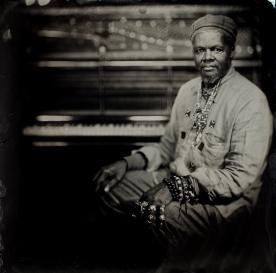
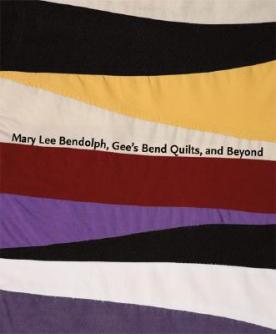
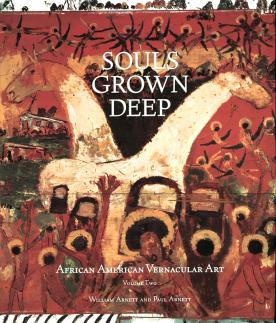
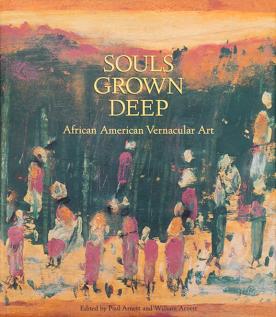
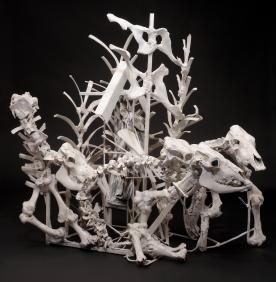
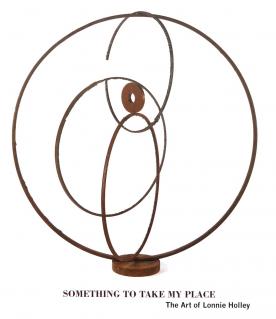
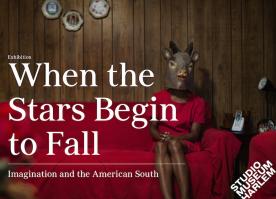
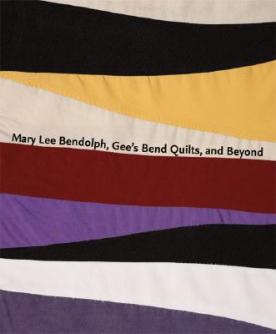
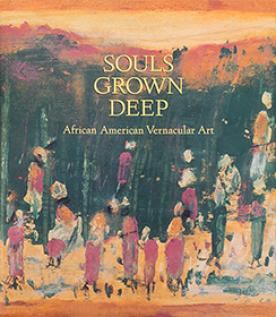
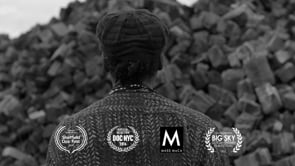
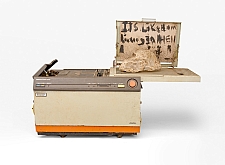
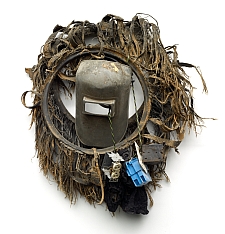
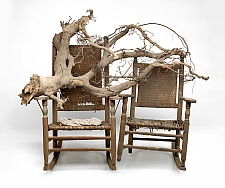
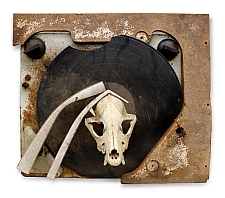
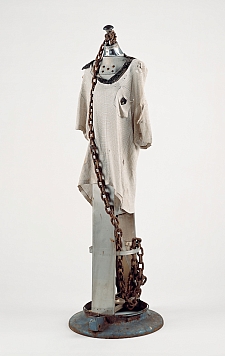
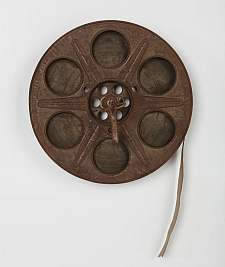
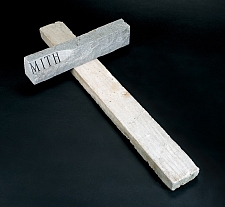
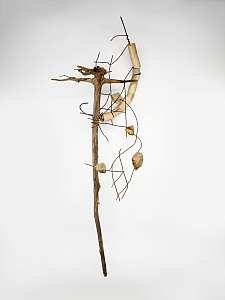
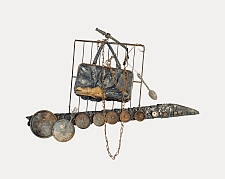
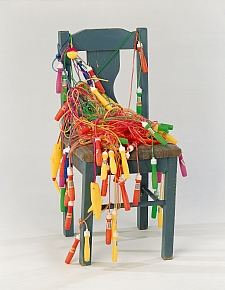
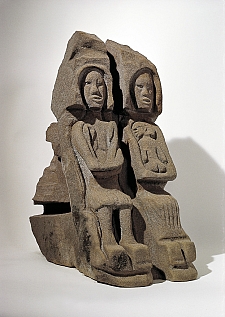
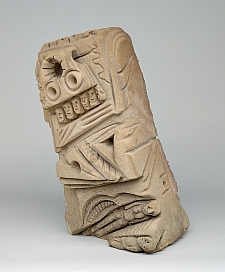
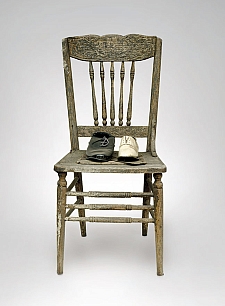
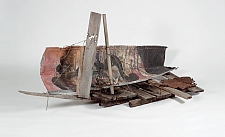
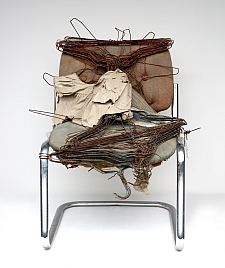
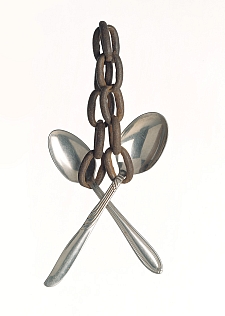
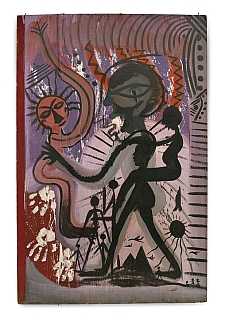
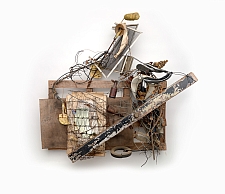
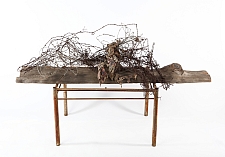
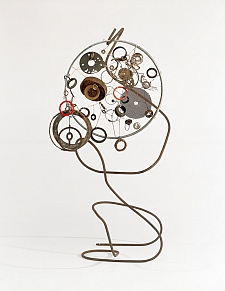
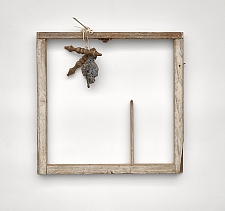
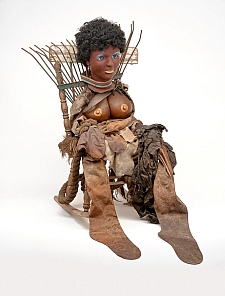
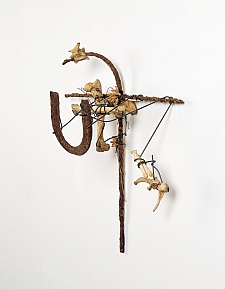
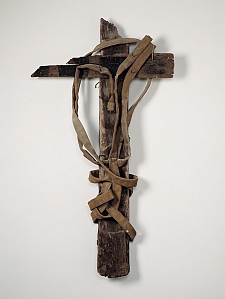
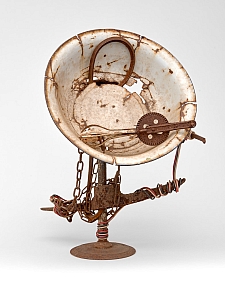
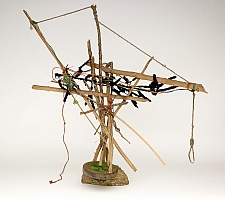
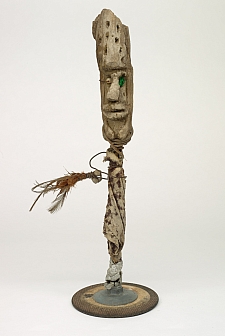
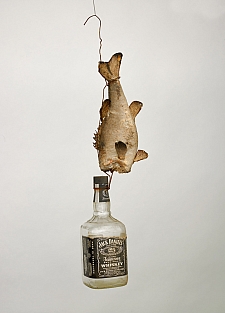
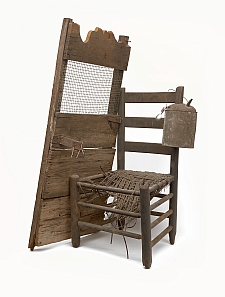
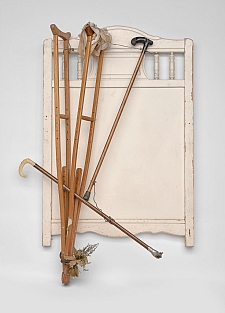
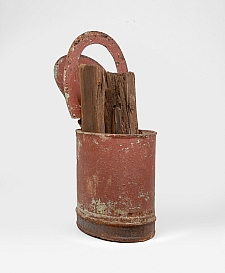
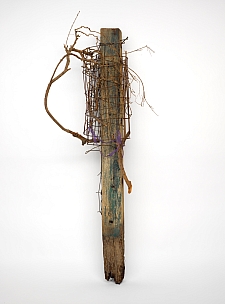
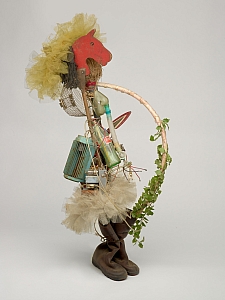
![LH - Tying Up the Rock [studio] - Master Image](/sites/default/files/styles/grid-hub-4/public/LH_16_51.jpg?itok=yGRlE00T)
